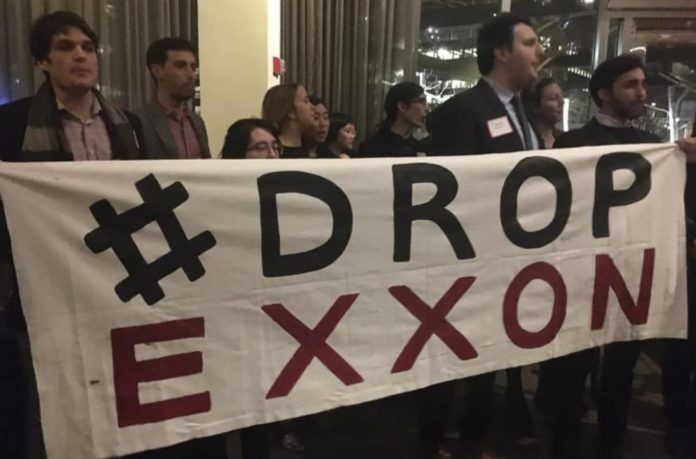In January, dozens of HLS students shut down a recruitment reception for Paul Weiss, the law firm defending ExxonMobil in a series of lawsuits related to the company’s role in polluting our planet and funding decades of climate denial. Two weeks later, one sixth of Yale Law School’s 1L class disrupted a second Paul Weiss reception, followed by similar actions from students at NYU and Michigan Law, who have joined hundreds of law students across the country in pledging to boycott the firm until they #DropExxon.
As young people and future lawyers, we’re asking Paul Weiss to live up to their self-proclaimed “unwavering commitment” to “serve the broader public interest.” We don’t think that includes covering up for Exxon, a corporation that has, according to climate leaders like Bill McKibben, “helped more than any other institution to kill our planet.” Recent research published by scientists at Harvard, George Mason, and Bristol universities confirmed that — despite knowing the truth about climate change over 30 years ago — Exxon continued to pollute our planet and fund a decades-long campaign of deception and misinformation designed to block the climate action needed to avert unprecedented human destruction.
Paul Weiss is working to shield Exxon from accountability for this malfeasance — and that is not the only aspect of their representation we find so concerning. We are also horrified by the approach Paul Weiss is taking to this work. Paul Weiss’s legal tactics on Exxon’s behalf have been labeled everything from “absurd” and “blatantly obstructionist” to “disingenuous” by different state attorneys general. They have filed countless strategic lawsuits against public participation (“SLAPP” lawsuits) intended to censor, intimidate, and silence Exxon’s opponents by burdening them with the cost of legal defense until they abandon their criticism. Outside observers say these legal counterattacks are “fueled by false information and unwarranted charges” and amount to little more than “harassing activists and writers.” These are precisely the same types of cynical tactics that Ted Wells, a partner at Paul Weiss, used for years in defense of Big Tobacco. It’s clear he and his team are trotting out this same unethical playbook today on behalf of Big Oil.
This is particularly disappointing behavior for a firm like Paul Weiss, which says their “secret sauce” is a refusal “to sacrifice culture and values in favor of the bottom line.” Paul Weiss does not need to defend toxic clients like Exxon; it makes a choice to do so. And we know it’s a morally relevant choice, because law firms have taken stands in the past against rogue actors. For example, in 1985, Covington & Burling, the largest law firm in Washington, D.C., dropped corporate clients that were complicit in South African apartheid after the firm faced boycotts from anti-apartheid law students at top schools. More recently, attorneys at Davis Polk were given leave to refuse to represent Big Tobacco clients if they had ethical objections.
Exxon’s destroy-and-deny business model should make them last in line to benefit from the reputable and legal firepower of an elite firm like Paul Weiss — not first. It is true that everyone deserves a lawyer. It is also true that Exxon is a $350 billion corporation with its own legal department — not one of the millions of Americans who are forced to navigate the courts without a lawyer. Paul Weiss has a choice, and the truth is that they are choosing their own short-term profits over humanity’s ever-narrowing chance at a livable future.
As law students, we have a choice, too. Many of us at HLS entered the legal profession because we think the law can be a force for good. We believe this system does not need to remain overwhelmingly rigged in favor of the rich and powerful. And we know that we are living in a do-or-die moment, with just a few years remaining to avert the worst consequences of the looming climate crisis.
That is why we are joining with students across the country and committing to disrupt business as usual until leaders in the legal industry drop Big Oil. And we’re asking you to join us. At this critical juncture in human history, all of us in the legal profession have a responsibility to grapple with the real-world impact of our work. We still have a path to a better world, and a livable future. And with the very future of human civilization on the line, why wouldn’t we take that path?
Aaron Regunberg and Kearney Coghlan are 1LS at Harvard Law School


